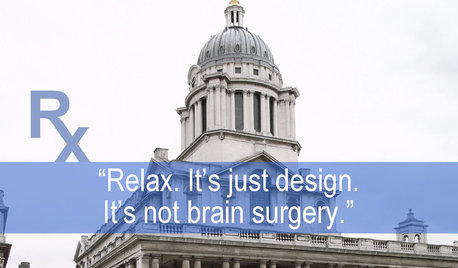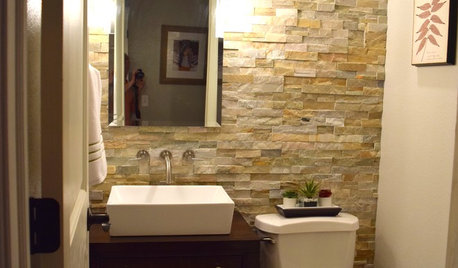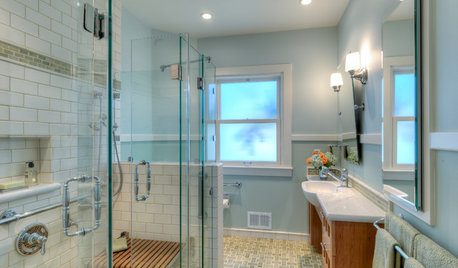Anyone Have Cataract Surgery?
Rudebekia
12 years ago
Featured Answer
Comments (52)
pam_25f
12 years agoalisande
12 years agoRelated Discussions
Upcoming cataract surgery (Warning: whining)
Comments (9)I would recommend one of each also (I think Ann T did this) for someone else, but I don't know if I would want it for myself. My work also requires that I be able to see very clearly close up, and for the past few years, I gave up on contacts and now have distance glasses (-3.5) and computer glasses that I wear much of the time. I can do most reading with computer glasses, but I can see detail even better with no glasses. Until recently, I could not read comfortably without glasses because I had to hold the book too close, but that is no longer a problem. I decided against surgery to see distance because I want always to be able to see close up. For surfing and snorkeling, I prefer to have distance vision, and for this reason, I was never a very good surfer. If I were much younger, I would opt for distance vision. I went to my opthamalogist last week to get checked for glaucoma. I'm just barely borderline, but my brother who is 5 years younger has been on meds for that for some time. The doctor that I see for this is in Santa Monica and is somewhat like Dougie Howser. He's 28, a surfer with blond hair and blue eyes, and he rides a 10-speed bike to work. He irritates me a bit by the way he talks, and he chided me for cancelling the last appointment, but I had to remind him that he was the one who cancelled instead of me. As it turned out, that was the day that his first son was born. He's going to Hawaii the month after I'm going, and he told me that now that he is a father, he would not risk ziplining, but I have already made reservations for that, although not on the scariest one, which would have required too much stenuous hiking while carrying 10 pounds of trolley. Glad to hear that your first surgery went well. By the way, you can get prescription goggles for swimming and snorkeling, in case you are nearsighted, and I believe that they also make prescription masks, but those would be expensive. You can get the swim goggles for under $30. I used to have some that I tried to use for surfing, but they don't work well for that, and so I gave them to my sister. Anyway, if you like to swim and are nearsighted, goggles are a good option. Lars...See MoreCataract surgery follow up
Comments (9)Thanks again. I have to admit that I was kind of upset with the monovision for the first day as my eyes felt so strained by the difference. I thought I had made a real mistake by going that way rather than both for distance. Now my brain is beginning to "get it" and I am more satisfied every day with the result. Some of my friends had told me cataract surgery "Was nothing." It's not nothing, believe me. The actual procedure was a piece of cake, but learning to see differently takes time. There is a learning curve, for sure....See MoreCataract surgery
Comments (14)Rose first of all, don't be afraid. There is no pain in having them removed. You will go to the center where it's being done and, upon arrival, they will put drops in your eyes and you sit and wait at least a half hour or more. Then you're given some more drops and taken to the surgical site where you'll put on a johnny but undress only from the waist up. They will mark the eye being done with a magic marker. When you get to the o.r. table the anesthesiologist will put a needle in your arm and that's it. You'll wake up and be sent to a recovery for an hour where you'll be given a drink and some type of muffin or cookies. They will patch your eye and you have instructions for the rest of the day, you'll get your rx and use the drops and then have to see the dr. the next morning so he can check it all. I've had both eyes done and both times we went out to eat after the surgery so, you can see, it's not painful. My dr. gives his patients something to relax when you get there but not all do. I really didn't need it, I wasn't nervous as I knew no pain was involved. I was soooo thrilled at the prospect of no glasses that I was counting the days to get it done....See MoreCataract surgery whine........
Comments (17)I wore contacts a couple of times, but not for long. They weren't monovision. My astigmatism was severe, and back when I tried contacts they couldn't correct my vision. I wore them for my wedding (didn't want to wear glasses, don't ask me why), and years later when I played volleyball. Lynn, with monovision, doesn't each eye have an area (different for each eye) in which it can focus clearly? I haven't found anything my left eye can focus on, near or far. What I'm supposed to have is called mini-monovision, which apparently differs from true monovision. What happens with night driving? The doctor told me yesterday I could drive at night as soon as I was comfortable doing so. I drove home tonight at twilight, and my left eye smeared the oncoming lights horribly. Jannie, that's discouraging. I'm 68, so my doctor might not be eager to redo the surgery either. But I was truly better off with cataracts than I am right now....See Moregmom74
12 years agogadgets
12 years agophyllis__mn
12 years agolisa_fla
12 years agoteresava
12 years agodedtired
12 years agokudzu9
12 years agoLily316
12 years agokudzu9
12 years agoRudebekia
12 years agoalisande
12 years agolinda_in_iowa
12 years agoSunnyDJ
12 years ago3katz4me
12 years agodedtired
12 years agosusanjf_gw
12 years agopatti43
12 years agokudzu9
12 years agoLily316
12 years agoalisande
12 years ago3katz4me
12 years agokudzu9
12 years agoalisande
12 years agodedtired
12 years agokudzu9
12 years agoRudebekia
12 years agoalisande
12 years agogrittymitts
12 years agokudzu9
12 years agodedtired
12 years agophoggie
12 years agogoldy
12 years agochisue
12 years agoalisande
12 years agodedtired
12 years agochisue
12 years agochisue
12 years agoalisande
12 years agoRudebekia
12 years agoalisande
12 years agoRudebekia
12 years agochisue
12 years agoRudebekia
12 years agokudzu9
12 years agodedtired
12 years agochisue
12 years agomunderwood10357
7 years ago
Related Stories

BEDROOMSThe Cure for Houzz Envy: Master Bedroom Touches Anyone Can Do
Make your bedroom a serene dream with easy moves that won’t give your bank account nightmares
Full Story
COFFEE WITH AN ARCHITECTTake a Breath, Relax — It's Just Design
Some prescriptions for some perspective, by an architect who has a hard time letting go
Full Story
LIFE10 Ways to Cope With Grief During the Holidays
If you are experiencing loss, take it from an experienced griever — life has changed forever, but it does get better
Full Story
DECORATING GUIDESOn Trend: Cut It Out With Norwegian Seating
You may find these nipped-out chairs extra full of modern style and comfort, thanks to their savvy designs
Full Story
BEFORE AND AFTERSSee a DIY Powder Room Transformation for $1,100
Determination, DIY skill and a stunning tile feature wall helped make this formerly dark and gloomy powder room feel spacious
Full Story
DECORATING GUIDESCalifornia Law: License to Practice Interior Design?
A proposed bill that would require a license to practice interior design in California has Houzzers talking. Where do you stand?
Full Story
UNIVERSAL DESIGNBungalow Bathroom Gains New Accessibility
Better design and functionality make life easier for a homeowner in a wheelchair
Full Story
PETSHouzz Call: Send in the Dogs
Have the greatest dog in the world? Share your best design photo featuring the dog you live or work with
Full Story
MOST POPULARFirst Things First: How to Prioritize Home Projects
What to do when you’re contemplating home improvements after a move and you don't know where to begin
Full Story
PETSSee a Deluxe 'Catio' Built for Feline Fun
Sixteen lucky cats get the run of a protected outdoor patio with ramps, steps and even a koi pond
Full Story



linda_in_iowa